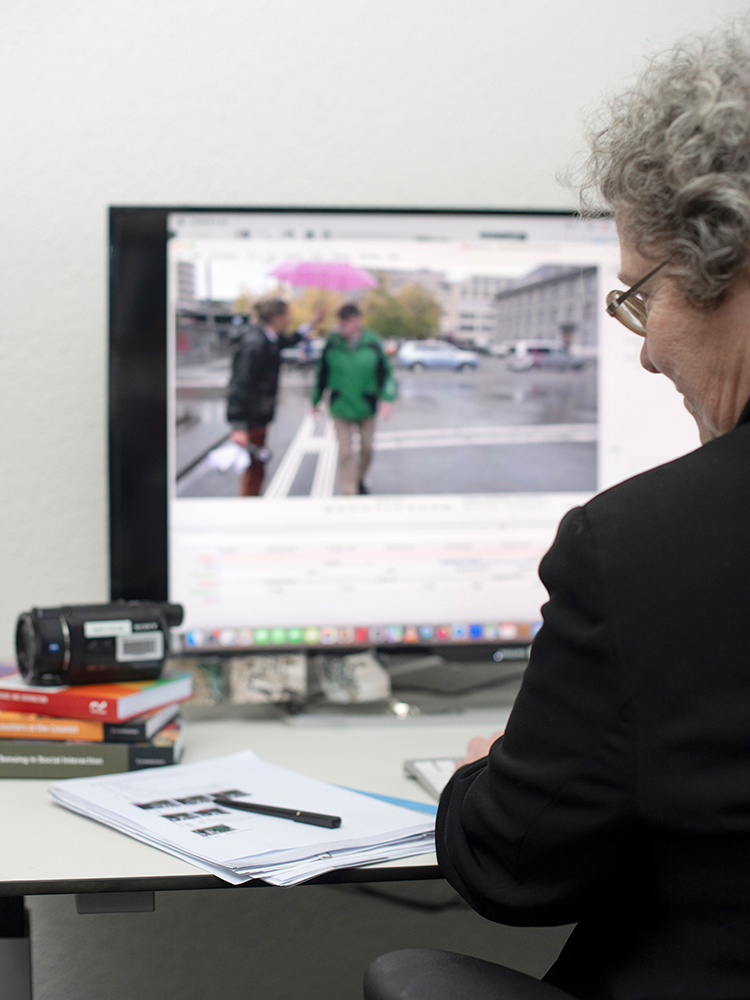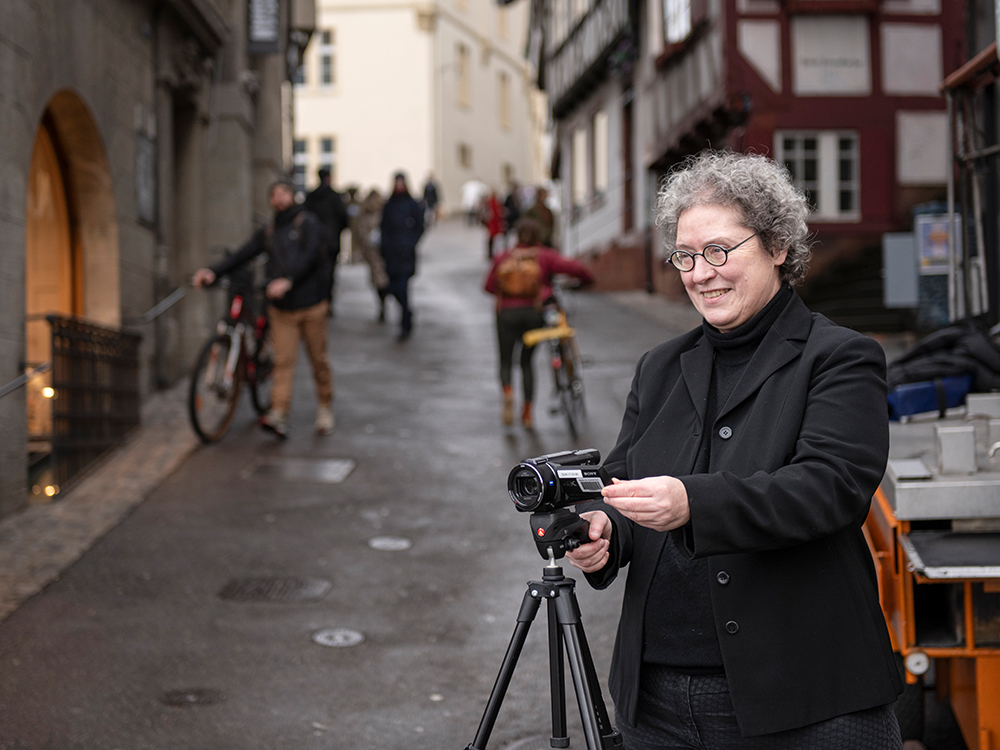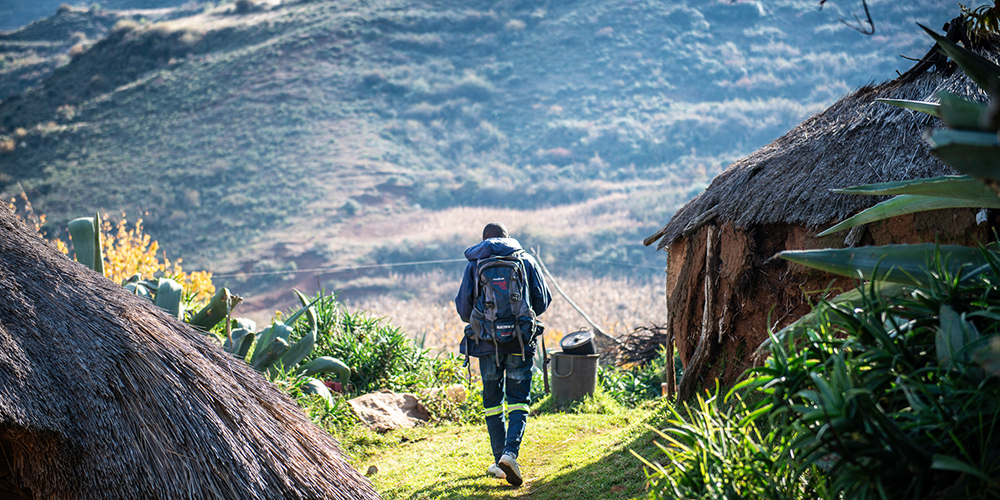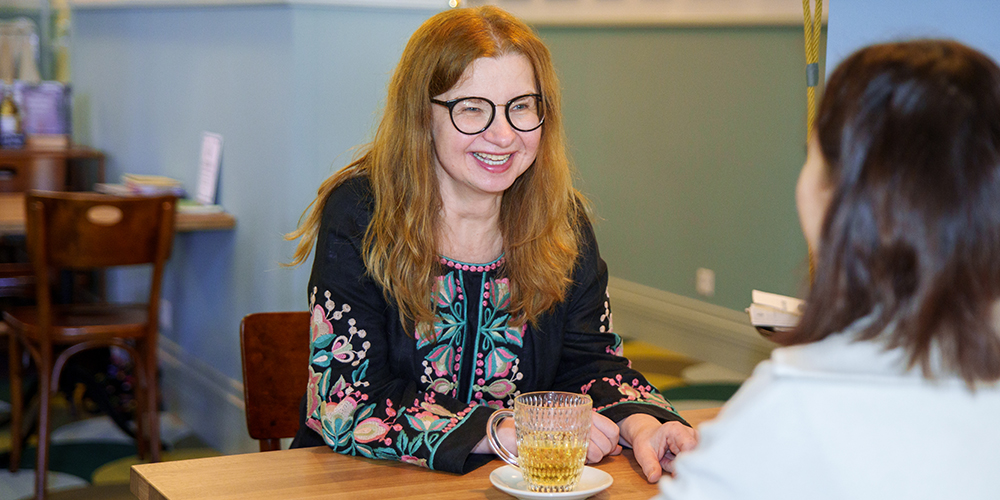Language is not only made up of words
Through video recordings of everyday situations, linguist Lorenza Mondada aims to understand language in all dimensions. We communicate not only with our mouths but with our entire bodies and all our senses.
A man buys a pack of cigarettes at the kiosk. Two tourists strike up a conversation in Lugano. A seller offers a piece of cheese for a customer to taste. For us, these are insignificant everyday encounters. Not so for Lorenza Mondada − the Basel linguistics professor films these occurrences and analyzes them down to the last detail: «Such social interactions are, for me, the lens through which I observe language and the body.»
Growing up in Ticino, she completed her linguistics studies at the University of Freiburg and subsequently earned her doctorate at the University of Lausanne. Over the next twenty years, her career took her around the world, teaching and researching in Switzerland and France initially, and later in Finland, Sweden, the USA, Japan, and many other countries. Since 2012, she has been a professor of General Linguistics and French Linguistics at the University of Basel.
Yet, Mondada is not truly settled – she is constantly on the move, spreading her ideas, initiating international collaborations, and seeking new inspirations. «Actually, I feel at home anywhere in the world,» she says.
Fundamental insights from simple situations
From the very beginning, Mondada pursued an interdisciplinary approach in her research, connecting linguistics with sociology, anthropology, and communication sciences. For her, language extends far beyond mere words. «We also use our hands, engage our entire bodies, and move around.»
To uncover these multimodal aspects, she started recording videos of social interactions in private or professional contexts: such as shopping at the kiosk, the collaboration of surgeons in the operating room, or citizen participation in grassroots democratic political assemblies.
For the analysis of the videos, she developed a transcription method, which is now used worldwide and makes analyses of social interaction comparable. The method documents – down to the second – every relevant word, gesture, and movement of the individuals involved. «When you then look at hundreds of people in video recordings, it is, of course, quite a lot of work,» says Mondada.
However, the effort pays off. With her meticulous research and an eye for the smallest details, Mondada was able to demonstrate that there is a common basis on which people can regulate their co-presence. «This mutual understanding, what we call intersubjectivity, is the foundation of our interaction, our sociability, and ultimately our democracy.»
How socially relevant this research is became evident during the corona pandemic. Mondada seized it as a unique opportunity and immediately started making video recordings in public spaces with her doctoral students – documenting how people adapted to the state of emergency, for example, in greetings or payment exchanges. While other research groups halted their work, Mondada's team published new results just six months after the start of the pandemic. The fact that her group successfully carried out this project in record time and that she can impart this experience to her doctoral students brings her particular joy – as she is deeply committed to nurturing the next generation of researchers.
The senses also play a role
Mondada is now taking her research a step further; it is becoming more extensive and complex. She is now incorporating the handling of objects and sensory perceptions such as touch and taste into her analyses. For a just finished project funded by the Swiss National Science Foundation, she filmed interactions in 15 European gourmet cheese shops, observing how sales staff and customers interacted with each other – during the tasting of different cheese varieties and while discussing the taste. In doing so, she identified fundamental patterns that characterize intersubjectivity and the interactive organization of sensory perception. A new SNSF project extends this to the sensory access to other people’s bodies in social interaction.
Another new project, in Brazil, focuses on objects of a completely different nature. There, Mondada accompanies a forensic anthropological team that identifies victims of the former dictatorship based on bones. «It is incredibly fascinating for me to witness how the team discusses, looks at and touches the bones. Bones are not just objects; they are human remains – and that means they are touched and examined in a very specific way.»
As the study in Brazil demonstrates, despite her numerous commitments, Mondada doesn't hesitate to take the video camera in hand and conduct fieldwork herself, even though it requires a lot of preparation time and empathy. To obtain permission to film and observe, she must first build trust. It helps that she can communicate effectively in many languages. «And in the cheese study, it certainly didn't hurt that I enjoy eating and am knowledgeable about cheese.»
Further Links
- Department of Languages and Literatures at the University of Basel
- LorenzaMondada.net
- The first five words: Multilingual cities in Switzerland and Belgium and the grammar of language choice in public space (SNSF project)
- From Multimodality to Multisensoriality: Language, Body, and Sensoriality in Social Interaction (intSenses) (SNSF project)
- Lorenza Mondada in the Uni News




